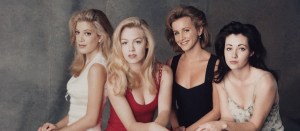Madea is returning, but not in the way you’d probably expect. Variety reported on Wednesday that Tyler Perry is developing a dramatic sequel series with Showtime centering on Madea‘s time in Atlanta in the 1970s. The series, titled Mable, will have a vastly different tone than the broad comedy that fans are used to from Perry’s usual cross-dressing antics.
“Long before she was the force of nature known as Madea, she was a smart, fierce, irresistible, dangerous, crazy 20-something black woman named Mabel Simmons,” reads the official synopsis. “When she moved to Atlanta in 1972 she set the city — and the world — on fire.” Perry and Tim Palen are serving as the creators and executive producers of Mabel, while JaNeika James and JaSheika James are attached to write and executive produce.
Videos by PopCulture.com
Due to it being a prequel and a drama, it’s clear that Perry will not be playing the role of Madea himself. He announced in 2018 that he would be retiring from playing the character after decades of donning the wig. “I’m happy to kill that old b—, I’m tired, man,” Perry explained to host Bevy Smith Monday on her SiriusXM radio show, Bevelations. However, he revealed on The Today Show why he decided not to kill her off in 2019’s A Madea Family Funeral. “She doesn’t die,” Perry explained. “She’s a family member… to a lot of people. You can’t kill off a family member.”
However, Perry was pretty insistent that this was the character’s last ride, as least with him donning the wig and bringing her to life. “Listen, I’m turning 50 this year, I don’t want to be her age playing her, OK?” he said. “It’s been a great run, the franchise has been amazing, and it’s done a lot of things for a lot of people, I think it’s time.” Still, Perry couldn’t help but tease a possible return. “Maybe she’ll do like Cher and do 10 retirements.”
Perry revealed on 60 Minutes in 2009 how the women in his own life influenced how he crafted the character. “Madea is a cross between my mother and my aunt,” he revealed. “She’s the type of grandmother that was on every corner when I was growing up. She smoked. She walked out of the house with her curlers and her muumuu and she watched everybody’s kids. She didn’t take no crap.”
“She’s a strong figure where I come from. In my part of the African-American community,” he continued. “And I say that because I’m sure that there are some other parts of the African-American community that may be looking at me now going, ‘Who does he think he’s speaking of?’ But, for me, this woman was very, very visible.”








